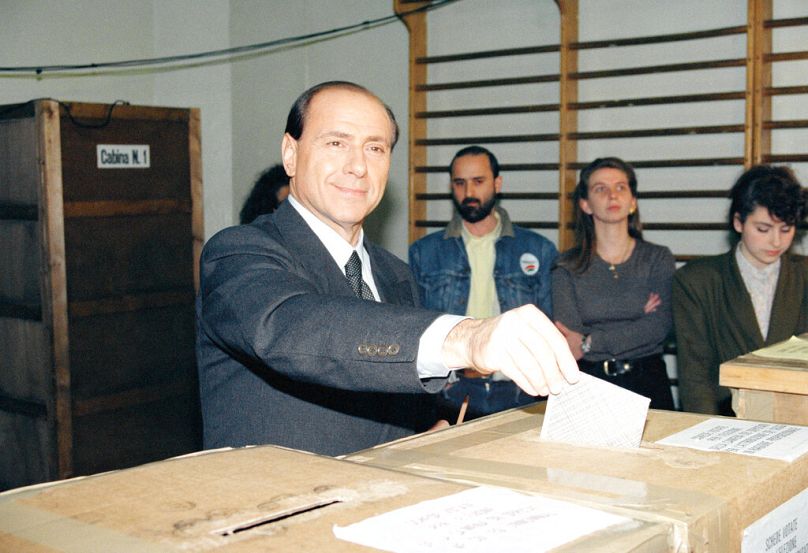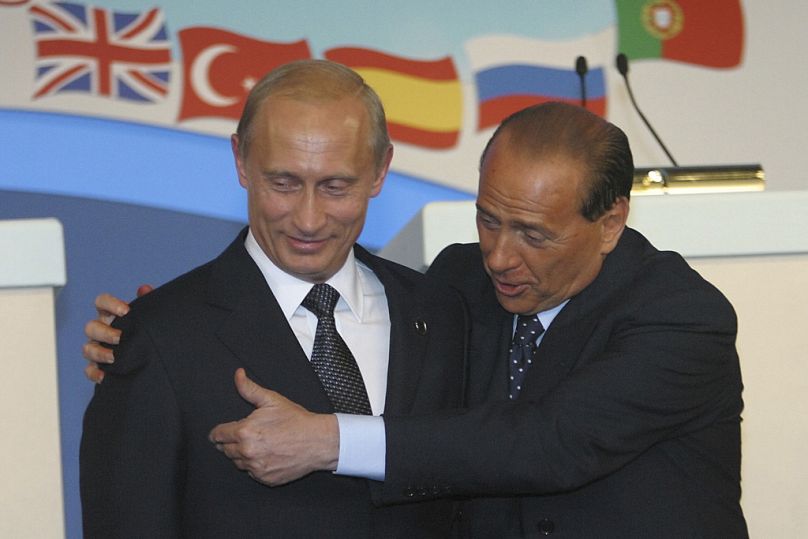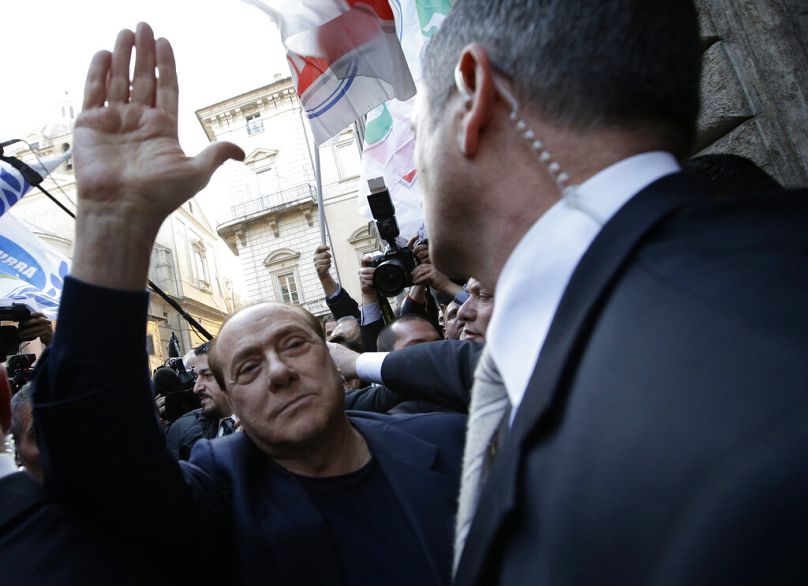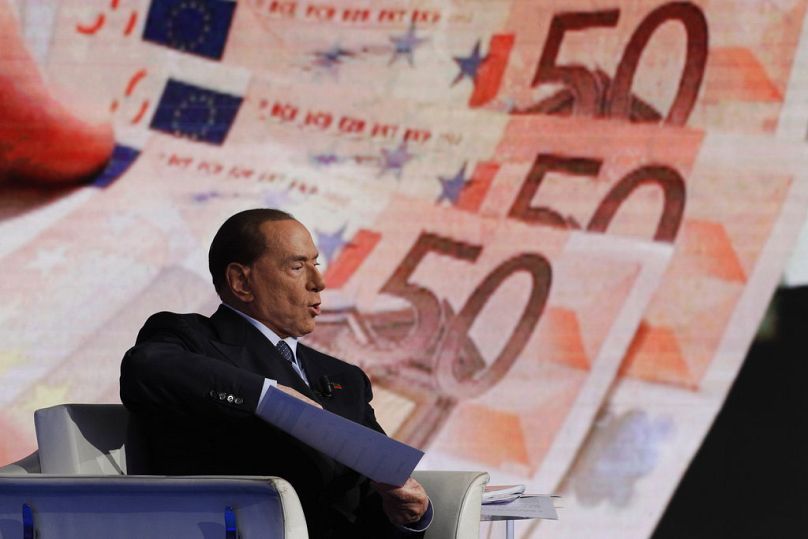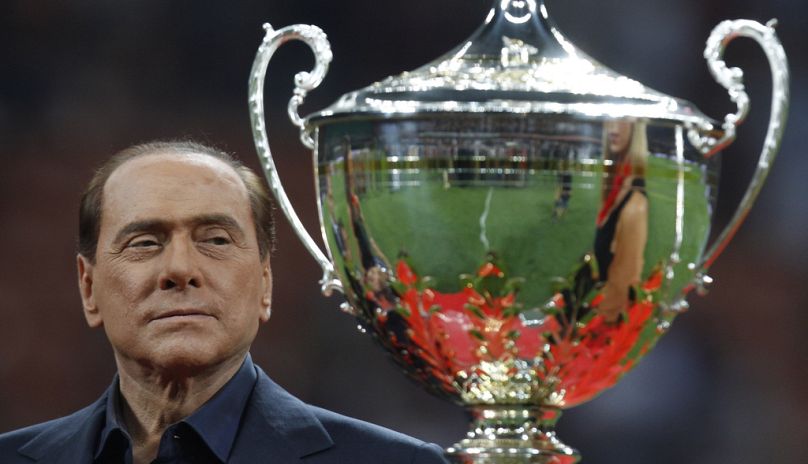Unlike today's autocrats who make grim threats against the institutions of the rule of law, Berlusconi brushed them aside in a light-hearted and smiling manner, with jokes, silk neckerchiefs, and catchy ditties — an authentic made-in-Italy product, ready to be exported, Giorgio Fruscione writes.
On Monday, Silvio Berlusconi departed from this world differently from the way he first appeared in our lives when he entered our living rooms through his TV stations, virtually sitting by our side while we ate dinner.
 ADVERTISEMENT
ADVERTISEMENT
 ADVERTISEMENT
ADVERTISEMENT
His 1994 public address declaring his “discesa in campo,” or descent into the field of politics, saw him make a further promise to be among the people, with the people, and for the people.
But for Berlusconi, the nearly three decades in politics would be thirty years he always lived above us.
His death was, perhaps, the only real thing he had done “as one of us”, one of the mantras of his political life, the one that in Italy gave rise to two malign trends of our politics: populism and anti-politics.
It is not completely true to say that with the death of Berlusconi, an era ends. The era that began with Berlusconi is more alive than ever.
A list of grievances amid the grieving
The populist rhetoric, the opening of the door and leaving it ajar for the extreme right, the hatred for independent journalists, the intolerance for judges, misogyny and measuring the value of women by the length of their skirts, rampant tax evasion and flirtations with autocrats halfway around the world — these are stronger today than they were in the early 1990s when the fear of the spectre of communism was still expanding.
Having come into the field to ward off the arrival of the communist enemy that had never been in power in Italy — nor would ever get anywhere near the offices in Chigi and Quirinale — Berlusconi used his economic power and a media monopoly to promote his own political initiative as a sacrifice in the name of the collective good, while the opposite was true: opportunism for personal gain.
This is not the place to recall his entrepreneurial background prior to his arrival in politics but rather the moment to consider Berlusconi as the precursor of authoritarianism as we know it today — that of Victor Orban, Donald Trump and, to a degree, even Vladimir Putin.
How much did normalising Putin cost us collectively?
It is no coincidence that Berlusconi considered the Russian president a great friend to the very end, swapping wine bottles even during the war and in defiance of sanctions.
After all, Berlusconi ended the "real one," the actual Cold War — this, according to him — with the Pratica di Mare agreement between Russia and NATO during the 2002 Rome summit.
The handshake between George W Bush and Putin at the summit actually normalised relations between the West and Moscow, whose political methods became acceptable after that. So did Berlusconi’s.
When in 2008 Berlusconi mimed a machine gun in response to a journalist who dared to ask Putin a question, it was not just a joke — after all, Russian independent journalist Anna Politkovskaya had been murdered in Moscow only a year and a half earlier — but further legitimisation of an authoritarian system with which the West deluded itself into thinking it could live with by importing gas.
What we do in life echoes in eternity
The ripple effects of his influence on the political events of today are aplenty. And many of the political actors behind them are the spiritual heirs of Berlusconism, especially outside of Italy.
Isn't the approach with which Trump is defending himself against ever-growing accusations by calling them “farcical” and politically motivated similar to that with which Berlusconi used to attack judges by calling them ”red togas”, a provocative reference to Roman Empire’s magistrates who held both judicial and executive powers?
Isn't the control over state media and the main private channels by Victor Orban in Hungary a model set by Berlusconi, who ruled through three public television channels in parallel with his three Mediaset channels?
Aren't attacks against independent journalists the prerogative of leaders who dream of their own “Bulgarian Edict”, a watershed moment for media freedom in Italy in 2002 when, during an official visit to Sofia, Berlusconi’s criticism got journalists Enzo Biagi, Michele Santoro and comedian Daniele Luttazzi removed from the air at the public broadcaster, RAI?
Doing what one wants and selling it as good for the people
Today, those mourning Berlusconi are mainly his followers and not his actual voters.
It is rather those leaders all over the world who, using the self-made man spiel, convey the same precarious assurances and illusory successes to the people.
All that just to leave them with higher public debt, tax evasion that remains legitimised and almost incentivised, and wages that stopped rising just as Berlusconi descended to the field to make us all better off.
But unlike today's autocrats who make grim threats against the institutions of the rule of law, Berlusconi brushed them aside in a light-hearted and smiling manner, with jokes, silk neckerchiefs, and catchy ditties — an authentic made-in-Italy product, ready to be exported.
Berlusconism, after all, is doing what one wants and what is convenient for one's business, finding a way around rules and institutions, and then propagandising all this as a universal and sustainable social and economic model.
It is the heavy-handed imposition of the private over the public, a form of liberalism where the increase in social divisions has been compounded by scorn towards the other gender.
It is the notion of a country-slash-enterprise ruled by a tycoon for the prime minister where women have been reduced exclusively to objects of pleasure, going to the parties at his villa San Martino in Arcore or dancing in prime time as various showgirls on his TV channels whose ratings corresponded to their appearance.
‘A great statesman, for better or worse’
In a country where, culturally and habitually, death turns anyone into a heroic martyr, the end of Berlusconi will not put an end to his way of doing politics, but it will monumentalise him in people’s memory as “a great statesman”.
It will historicise him, making him a man who “for better or worse” contributed to the country's history.
And finally, it will humanise him, showing his Mediaset presenters' live tears and flowers near the hospital in Milan where he passed away as the tangible sign of a man who was loved by the people not in spite of, but precisely because he stood above them, serving them for his own personal interests.
That is the social and political model that is now more entrenched than ever in Italy and beyond. And that is why Berlusconi's death is not the end of an era, but his actual triumph.
Giorgio Fruscione is a political analyst and a freelance contributor to several domestic and international media outlets. He is a Research Fellow at the Italian Institute for International Political Studies (ISPI), with his analyses focusing mainly on Western Balkans politics and geopolitics.
At Euronews, we believe all views matter. Contact us at view@euronews.com to send pitches or submissions and be part of the conversation.











